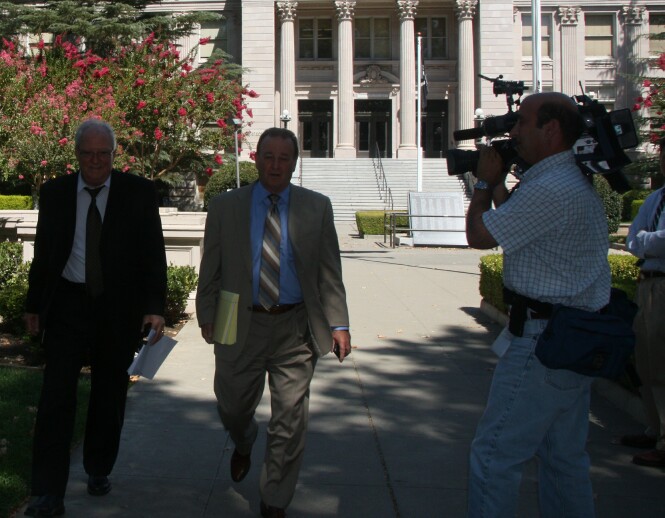
On Monday morning, after a brief inquiry with Juror No.11, the judge granted her request for dismissal based on what she claimed to be a language barrier. Left unanswered by the judge and unquestioned by the defense is how she could understand enough English to render a guilty verdict, but not enough to participate in the deliberation on the penalty phase.
Last week, the penalty phase was concluded and closing statements were argued on Tuesday. The jury basically got the case on Wednesday and began deliberating, but stopped midway through their deliberations on Thursday.
Juror No.11 sent the Court a hand-written note asking to be excused from further deliberation and replaced with an alternate juror.
Juror 11 wrote, “Your Honor: I was raised in foreign country and it is very difficult for me to make a dessision from point of view of this country. I tried my best, but now I see that I am dragging other juries down. I am asking you to replace me by alternative juror, please.”
At 8:30 on Monday morning, both the defense and prosecution were allowed to argue their points. District Attorney Jeff Reisig joined in the juror’s request for her dismissal, arguing that PC 1089 grants broad discretion to the court to dismiss if there is good cause that the juror is unable to perform his or her duty.
Mr. Reisig argued that, unlike some descriptions, there is no hint as to which way she was leaning or a suggestion that she was having trouble rendering a decision due to grappling with the death penalty.
He then went on to cite evidence that, during the voir dire in April, she had indicated that she was born and raised in Russia and did not come to the United States until she was 34 years old – apparently 21 years ago as she is now 55 years of age.
She expressed some doubts as to her ability to understand some of the language and, in particular, what she called “special words.” However, she responded affirmatively that she would be able to competently perform the necessary duties of a juror responding, “I’ll try” and “I’ll do my best.”
Judge Richardson noted that this issue was raised during voir dire and that both sides allowed the juror to stay, despite each side having remaining peremptory challenges that they could have used to dismiss her had they had concerns.
While the prosecution saw this as a language issue, the defense team, led by Dwight Samuel, saw the issue very differently. They argued that she was talking more about the method of her deliberations and conflict with other jurors and that she did not understand their point of view. He suggested that this is something that needs to be handled inside the jury room and called it a “dangerous situation” to intervene.
Here he raised the point that she apparently understood the law in the guilt phase. “She performed all of her duties adequately in the guilt phase,” Mr. Samuel would argue – though he would not raise the issue later.
With clear disagreement as to what the written statement meant, Judge Richardson, after careful consideration, decided that the case would be in jeopardy if they did not do an inquiry. He acknowledged the need to do it delicately, to avoid having the juror bring up issues from deliberation.
He called her written statement ambiguous and said he does not know what key parts of it mean.
After more back and forth, they waited until Juror 11 arrived and carefully questioned her.
Judge Richardson asked her if there was a language barrier and if she had been having trouble understanding the nuances of the language. She said that she might be having trouble with the nuances, but that is not the principle issue.
She then said that the language barrier was “partially” the issue and that sometimes she cannot understand the words because she said some words you cannot translate.
She said she had felt inhibited in the deliberation process, she said that she had not participated freely and there was a limitation in her language skills.
She also said some of the documents had given her trouble as she attempted to weigh all of the evidence.
She said it was difficult to understand others’ points of view since she was raised in Russia.
When she was dismissed, Jeff Reisig argued that she succinctly put it that she was not able to fully understand and not able to fully translate. Mr. Reisig then read from case law. The ruling suggests that a juror can be dismissed when language limitations “render the juror unable to perform their duties under 1089.”
Mr. Samuel argued that lack of understanding is not good cause and creates a bias, because even native English speakers lack the language and understanding of the law at times. He argued that Mr. Reisig did not properly cite the precedent.
He also argued, “We don’t have a major language problem here.”
But Mr. Samuel needed to reiterate that the juror was able to participate in the guilt phase. Moreover, she had no trouble conversing and understanding the issues when Judge Richardson conducted his inquiry.
Nevertheless, it was clear what Judge Richardson was going to do.
“Due to Juror 11’s insufficient command of the English language,” Judge Richardson ruled after he returned from looking at the case law, “the juror’s ability to further proceed is impaired.”
There was nary a protest at this point. The judge simply had his clerk select from a basket the number of one of the six alternate jurors.
A number of experts believe that the judge’s ruling puts in jeopardy the case and will create a basis for appeal.
We will have further analysis on Wednesday, but there are three critical points here. One, which we raised previously, that the juror apparently had no problem in the guilt phase, and it would be difficult to justify how she could understand the issues sufficiently in the guilt phase but not in the penalty phase.
Second, her initial response to the question about the language was that it was only “partially” the issue, but she seemed to get talked into taking that path as she quickly saw it as the easiest way to be dismissed.
Judge Richardson really did not probe her sufficiently on whether there were ideological issues that were causing the problems with her colleagues. He tried to avoid substantive issues, but still needed to determine whether language was really the root cause or whether it was something else.
Finally, as we mentioned previously, while the woman spoke with an accent, her English was actually pretty good and she was easy to understand. She had no problem discussing the issues with the judge.
—David M. Greenwald reporting





[quote]We will have further analysis on Wednesday, but there are three critical points here. One, which we raised previously, that the juror apparently had no problem in the guilt phase, it would be difficult to justify how she could understand the issue sufficiently in the guilt phase but not in the penalty phase.[/quote]
Actually it makes perfect sense to me. In the guilt phase of the trial, the evidence was overwhelming, and it was fairly easy to come to a verdict without much discussion among jurors or consulting legal documents. However, when it came to imposition of the death penalty, more involved discussion may have ensued which required the jurors to have lengthy conversation with each other and the necessity of consulting legal documents. Suddenly the language barrier very well may have become a problem for this juror.
Frankly because the defense did not object to this juror, knowing she may have had a language barrier, I doubt an appeal will do the defense much good…
From [url]http://www.kcra.com/news/29766257/detail.html?taf=sac[/url]:
[quote]The judge then called juror 11 into the courtroom to be questioned. Speaking softly and with an accent, she said that she was nervous.
“I tried to do my best” to weigh the evidence, said the juror.
At first, she said that her request to be dismissed was based partially on her limited English language skills.
Later, when Richardson asked if that was the core reason, she answered, “Yes.”
“My English is limited. I cannot be that verbal,” said the juror. “I do not want to be an obstacle.”
After the juror left the courtroom, Richardson agreed to allow the juror to be dismissed.
“The court is of the view she is unable to perform her duties in this stage of the proceeding,” said Richardson.
Read more: http://www.kcra.com/news/29766257/detail.html#ixzz1dnAydRLC%5B/quote%5D
[i]”Left unanswered by the judge and unquestioned by the defense is how she could understand enough English to render a guilty verdict, but not enough to participate in the deliberation on the penalty phase.”[/i]
That is the question. I suppose precedent will provide the answer. But it does seem to me hard to believe that the verdict of “guilty” will hold up if the judge has decided that her English language skills were insufficient for her to fully participate in the sentencing question*.
I would like to be critical of the judge and the lawyers for allowing such a juror to make it onto this panel of 12, if her language skills are truly so deficient that she could not argue in English her point of view. However, I suspect that if someone had seriously probed the question of an immigrant citizen’s English language skills, that would have been deemed ethnic discrimination of some sort. I am certain that the politically correct crowd would raise the fear that a language test would harm the interests of a broad class of citizens (perhaps including native born Americans who are poorly educated or otherwise have trouble with verbal expression).
Since this juror has been disempanelled, and since there may now be a large risk** of having the verdict overturned on that basis, I would think the defense and the prosecution both have good reason to compromise: have the defendant plead guilty to all charges in exchange for the DA recommending a sentence of Life w/o Parole. That saves the defendant from the death penalty in 40 years; and it saves the people the cost of yet another trial and the cost of appeals on this basis.
*I guess the option of assigning to her a bilingual aide at this point in the proceedings is considered wrong?
**I don’t [i]know[/i] that there is a large risk or any risk of having the verdict overturned due to this disempanelling. I am just guessing that is the case. If the DA and Judge Richardson know otherwise, obviously they will allow the case to procede with the 13th juror sitting in. But it seems pretty easy to me to argue successfully on appeal of the death sentence that the 13th juror may have found Topete not guilty or that if the juror who was removed had been fully able to express herself in English that she may have argued for a not guilty verdict.
[quote]But it seems pretty easy to me to argue successfully on appeal of the death sentence that the 13th juror may have found Topete not guilty or that if the juror who was removed had been fully able to express herself in English that she may have argued for a not guilty verdict.[/quote]
That’s a stretch… this juror has not indicated in any way she would have found Topete not guilty of the crimes charged. There is a big difference between finding guilt versus imposing the death penalty, then see my discussion above as to why the language barrier may have arisen in the penalty phase…
“A number of experts believe that the judge’s ruling puts in jeopardy the case and will create a basis for appeal.”
Can somebody verify that all murder convictions are automatically appealed in California? If so, there is no dispute on whether or not there is an appeal. Rather, the dismissed juror will be added to the many other disputed segments of any trial of this complexity.
[i]”Can somebody verify that all murder convictions are automatically appealed in California?”[/i]
I don’t know about all [i]murder[/i] convictions being automatically appealed. But I do know that all death sentences are automatically to the state Supreme Court. [quote] California Penal Code Section 1239. (b) When upon any plea a judgment of death is rendered, an appeal is automatically taken by the defendant without any action by him or her or his or her counsel. The defendant’s trial counsel, whether retained by the defendant or court appointed, shall continue to represent the defendant until completing the additional duties set forth in paragraph (1) of subdivision (e) of Section 1240.1. [/quote]
RICH: [i]”… the 13th juror may have found Topete not guilty …”[/i]
ELAINE: [i]” That’s a stretch… this juror has not indicated in any way she would have found Topete not guilty of the crimes charged.”[/i]
It’s not only the opinion of the disempanelled juror. The alternate was not a part of the deliberations for the guilt phase. So it remains an open question as to what conclusions the alternate might have had during the guilt phase; and how that individual’s views might have affected the opinions of the other 11.
rifkin writes: [quote]I don’t know that there is a large risk or any risk of having the verdict overturned due to this disempanelling[/quote]
…nevertheless elects to use the word “large” risk…
“Frankly because the defense did not object to this juror, knowing she may have had a language barrier, I doubt an appeal will do the defense much good… “
Elaine, that’s a similar point that Jack Chin made to the Enterprise, the problem is that you run into the problem that perhaps they don’t know what they don’t know.
Concerning the above comment and response, it is the duty of the defense to make this determination. The defense can’t later claim ignorance due to attorney ineptitude.
[quote]…you run into the problem that perhaps they don’t know what they don’t know…[/quote]
Not sure I am following you here… The defense had the opportunity to disqualify this juror and had no problem with her, so they have to take this juror warts and all. My guess is that an appellate court will not overturn this on appeal…
Mr. Coleman: All death penalty convictions are automatically appealed.
“The defense can’t later claim ignorance due to attorney ineptitude. “
Actually they can claim ineffectual representation and it is often grounds for overturn on appeal.
Elaine: Almost every legal expert that was interviewed by the media disagrees with you. The defense and prosecution both took the juror. The judge made that point. However, they still decided that the language barrier was a problem at the penalty phase. If it was a problem at the penalty phase, then most attorneys believe it is a problem at the guilt phase and that is where the jeopardy occurs.